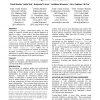Free Online Productivity Tools
i2Speak
i2Symbol
i2OCR
iTex2Img
iWeb2Print
iWeb2Shot
i2Type
iPdf2Split
iPdf2Merge
i2Bopomofo
i2Arabic
i2Style
i2Image
i2PDF
iLatex2Rtf
Sci2ools
CHI
2002
ACM
2002
ACM
Cognitive cubes: a tangible user interface for cognitive assessment
Assessments of spatial, constructional ability are used widely in cognitive research and in clinical diagnosis of disease or injury. Some believe that three-dimensional (3D) forms of these assessments would be particularly sensitive, but difficulties with consistency in administration and scoring have limited their use. We describe Cognitive Cubes, a novel computerized tool for 3D constructional assessment that increases consistency and promises improvements in flexibility, reliability, sensitivity and control. Cognitive Cubes makes use of ActiveCube, a novel tangible user interface for describing 3D shape. In testing, Cognitive Cubes was sensitive to differences in cognitive ability and task, and correlated well to a standard paper-and-pencil 3D spatial assessment. Keywords Cognitive assessment, neuropsychological assessment, tangible user interfaces, three-dimensional user interfaces, constructional ability, spatial ability
CHI 2002 | Cognitive Ability | Cognitive Cubes | Human Computer Interaction | Keywords Cognitive Assessment |
Related Content
| Added | 01 Dec 2009 |
| Updated | 01 Dec 2009 |
| Type | Conference |
| Year | 2002 |
| Where | CHI |
| Authors | Ehud Sharlin, Yuichi Itoh, Benjamin Watson, Yoshifumi Kitamura, Steve Sutphen, Lili Liu |
Comments (0)

